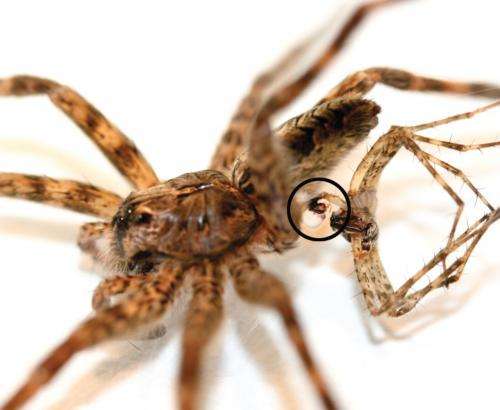June 20, 2013 report
Male dark fishing spiders found to die spontaneously after mating

(Phys.org) —Behavioral biologists at the University of Nebraska have found that male dark fishing spiders become immobile immediately after mating and die a short time later. In their paper published in the journal Biology Letters, the team describes the mating behavior of the spiders and notes that the male dies spontaneously without assistance from the female.
As with many other spiders, the male dark fishing spider is much smaller than the female counterpart. Unlike other species however, the death of the male after mating isn't due to the female killing him. Instead it appears his death is due to a form of genital mutilation.
Field observations near the University by the research team revealed that when the male approaches the female (with a preference for virgins) he mounts her, rocks her body and ejaculates sperm onto a sperm-web. That sperm is then pulled into dual pedipalps (appendages on the front end of its body) which fill with fluid causing them to inflate. The male spider then inserts one of the engorged pedipalps into the female genital opening and deposits the sperm. Once that's done, the male's legs curl under him and he becomes immobile and if not eaten by the female dies within a couple of hours. For the male, because he only ever gets a chance to mate once, this is a form of monogamy called monogyny (because it's strictly one sided).
Closer observation of male spiders after copulation showed that the pedipalps remained inflated after mating, an unusual occurrence for spiders. The researchers speculate it's likely the reason the spider dies after mating. In the lab they found that accidently causing the pedipalps to inflate in a few specimens led to the same result—the spiders curled up, became immobile and died after a couple of hours. In testing the males after copulation they found them to be completely unresponsive to touching poking or prodding. They also note that because the females generally eat the male afterwards, becoming sated in the process, there is a strong chance that the sperm from the male will result in offspring. Thus, the males' mating ritual appears to convey a reproductive advantage.
More information: Spontaneous male death and monogyny in the dark fishing spider, Biology Letters, Published 19 June 2013 doi: 10.1098/rsbl.2013.0113
Abstract
Monogyny (male monogamy) is found in a diverse assemblage of taxa, and recent theoretical work reveals that a male-biased sex ratio can favour the evolution of this relatively rare mating system. We integrate this theoretical framework with field observations and laboratory experiments involving the sexually size dimorphic fishing spider, Dolomedes tenebrosus, to test the prediction that this species exhibits monogyny. Field surveys revealed a male-biased sex ratio, likely resulting from different life-history strategies (early male maturation). Results from mating trials supported our prediction of monogyny as we discovered that males mate with a single female. Unexpectedly, however, we observed that mating results in obligate male death and genital mutilation. Additional field observations of released individuals suggest that males are not limited by their ability to encounter additional females. Controlled laboratory assays demonstrated that males discriminate among virgin and non-virgin female silk cues, consistent with predictions of first-male sperm precedence. In summary, we report a novel case of male self-sacrifice in a species that exhibits female-biased sexual size dimorphism, male-biased sex ratio, genital mutilation and a suggestion of first-male sperm precedence; all of which are consistent with theoretical predictions of the evolution of monogyny.
Journal information: Biology Letters
© 2013 Phys.org




















